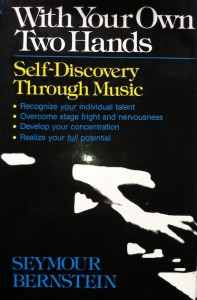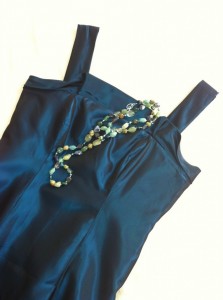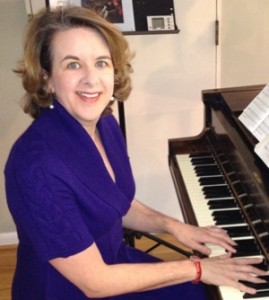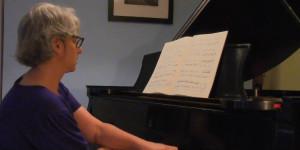During a performance of the luscious Arietta from Beethoven’s Opus 111 Sonata, the concert pianist Seymour Bernstein made the mistake of opening his eyes. Usually the Arietta transported him to such a degree that he played the music with his eyes closed, his head leaning back.
When he looked down at the keyboard, “’I became distracted instantly at the sight of my hands moving slowly from chord to chord,’ he writes. ‘What is the next note?’ I asked myself.” Realizing that he was staring into the maw of a memory breakdown, Bernstein shut his eyes and kept them closed until he reached the movement’s lilting variations.
I resonated with this story in Seymour Bernstein’s book, With Your Own Two Hands: Self Discovery Through Music. Although I do not have the skill to sustain the slowly building ecstasy of the Arietta (I hope to someday), I play rapturous passages with my eyes closed. For a performance, Bernstein counsels, the pianist should know ahead of time when she will open her eyes and where she will train them on the keyboard.
Reading With Your Own Two Hands was like taking a master class with this eminent teacher and composer. And what a class it was. Throughout the book, Bernstein cajoles, lectures, and demonstrates how to improve one’s pianism. The pages packed with information, I could have used more anecdotes of Bernstein’s experiences, such as with the Arietta. Yet I found reading this book was not unlike practicing the classical piano music: for the time and concentration required, the rewards were incomparable.
The book opens with a section called “Why Don’t You Practice?” Why indeed, I asked myself after reading his persuasive argument that those of us who harbor a passion for classical piano music have the right—in fact, the obligation—to work at our music. Practicing is a “process leading towards self-realization.” When we practice, we gain access to our emotions, to our reasoning process, and the ability to balance the two.
In the middle part of the book, Bernstein explores the art and theory of mastering the piano. He advises, for example, that when “playing a difficult passage on the piano, excess tension (involuntary tension) will accumulate as a compensation for a lack of muscular strength,” an elegant summary of my own experience with my extended pinky. I liked the exercises he suggested, and I experimented with some of his tips on how to use my body to extract the most from the music.
What most captured my imagination in this section was Bernstein’s emphasis on feeling:
- “Music is a language of feeling,” and a music’s score captures on paper the most private feelings of a composer.
- Resist the temptation to play music without feeling, even when learning a work. “Even a scale must be supported by a musical feeling.”
- Feeling should take over the body and breath. ”The arms, torso, and feet must all participate in expressing musical feeling.”
- Practice until you determine the precise emotion “you desire to express in each phrase” and then identify the “corresponding physical sensation or movement that powers that emotion.”
- On days when you have trouble accessing your feelings, perhaps due to nervousness, “you can induce your most expressive playing by consciously reproducing those movements.”
The idea that feeling should accompany the sounding of each note opened up for me an entirely new way of practicing.
In the book’s final section, “Fulfillment Through Performing,” Bernstein declares that the amateur, through devotion to music, “can benefit from performing in much the same way as does the artist.” Bernstein treats in detail the question of how to memorize a work for a concert and how to combat nervousness. I especially benefitted from his regimented program for memorization, the first step being to memorize each hand separately, a challenge more difficult than it sounds.
For the amateur pianist and student of adult piano lessons, With Your Own Two Hands provides the opportunity to experience this master teacher’s tips, counsel, and unflagging enthusiasm for the piano. At the end of this wonderful book, Bernstein writes, “This has remained with me: music in its wisdom can govern the way a person lives.”





0 Comments